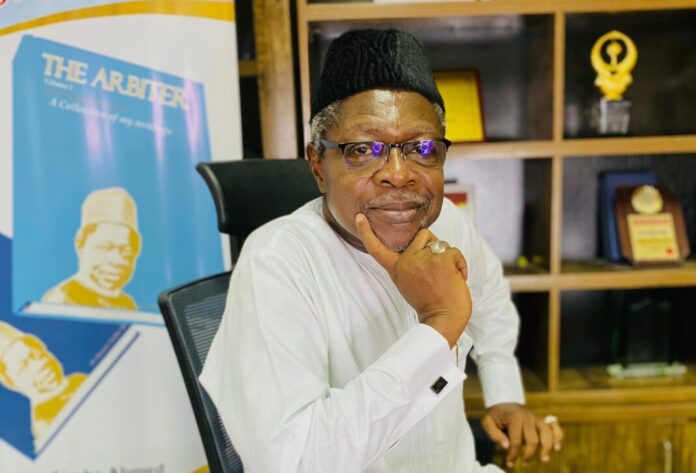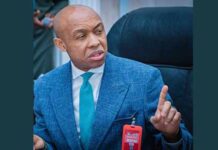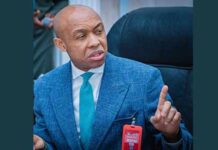There is this hullabaloo that has enveloped the country, with debates all over, in some instances threatening to degenerate into fisticuffs. It is all about the Tax Reform Bills.
Even though, after all is said and done, it may end up as an issue that signifies nothing but being blown out of proportion, it made me recall Macbeth’s speech in William Shakespeare’s Macbeth.
In his speech, he surmised that there is no meaning or purpose in life. Understandably, with his wife dead and armies marching against him, he came face to face with the transience of life. He visualised his life following a “way to dusty death” and likened life to a candle flame.
To Macbeth, “Life is but a walking shadow; a poor player that struts and frets his hour upon the stage, and then is heard no more: it is a tale told by an idiot, full of sound and fury, signifying nothing.”
We may not say the Tax Reform Bill is a tale full of sound and fury but when considered from the submission of the Revenue Mobilisation Allocation and Fiscal Commission (RMAFC), the whole idea does not signify anything; it may amount to nothing. But that is if we are truly practising constitutional democracy and desirous of adhering to it.
In a 2470-word memorandum, the RMAFC buttressed the fact that tax reforms are good for the overall interest of the country’s economy but pointed at complexities in determining tax by derivation as “VAT is a tax levied on the consumption of goods and services. The final tax burden falls on the consumer, and the tax is remitted by businesses (agents of VAT collection) to the tax authorities. The complexity in determining the taxpayer’s “residence” for derivation purposes arises when goods are purchased in one location and consumed in another, the seller and buyer operate across state boundaries, and VAT reporting systems do not track the end-use location effectively.”
The memorandum gave an example: “A Man from Kano Buys a Fuel Pump in Lagos for Use in Kano State.”
Most importantly, the memorandum reminded us that Section 162 (2) of the 1999 Constitution of the Federal Republic of Nigeria (as amended) empowered the RMAFC to determine the formula for the equitable sharing of revenue among the three tiers of government and to ensure that such formula reflects the principles of fairness and justice. It then asserted that the Constitution conferred on the RMAFC the sole power to mediate in matters of revenue allocation for the three tiers of government.
Paragraph 10.2 of the memorandum warned that “The Constitution, being supreme, does not envisage that any other Act of Parliament such as the VAT Act could assume this responsibility. Any such attempt would contravene the Constitution. Therefore, the RMAFC remains the sole arbiter in producing allocation formulae that are fair and equitable for the three tiers of government. Any deviation from a formula crafted by the RMAFC risks violating constitutional provisions and undermining the Commission’s role as the impartial arbiter of revenue allocation in Nigeria.”
Sometimes, you wonder what our lawmakers know. Many have been in the National Assembly more than once, including the Senate President, his deputy and principal officers. Yet they were at each other’s neck on an issue they had no right to legislate. Even those against the bills were not doing so because of their knowledge that it was not their turf as lawmakers. Sad, isn’t it?
Nonetheless, we will say the little we can about the issue, hoping it will contribute to the debate on tax reform.
In the first place, why should a Nigerian, especially a Northerner, raise the muscles of his neck over any tax for that matter, considering that it is in the tradition of the Northern system of government, which even the colonialists met, to pay tax?
Not only that, there was a time when northerners and, of course, most Nigerians willingly gave, not even paid, tax. Sometimes, payments are deducted from the source, which means that the payee had no choice but to see the money, in this context, deducted.
A story was told of how, in the 50s, northerners willingly taxed themselves and gave the proceeds for the education of their sons in the United Kingdom, then the focal point for education. It was said that northerners were made to contribute one penny each, and they did so happily. That story may or may not be the whole truth but it is an indication of what trust can do – to make people give taxes out of their own volition. Two of those who benefited were Doctor Bukar Shuaib and AJKG Imam.
Dr Bukar Shuaibu, CFR, born in 1927 in Geidam in the old Borno Province (now Yobe State), attended Elementary and Middle School, now Government College Maiduguri, before proceeding to Barewa College between 1934 and 1948. He was at Liverpool University from 1949 to 1954 where he obtained a Bachelor’s Degree in Veterinary Medicine. A member of the Royal College of Veterinary Surgeons, he was the first Northerner and Nigerian to achieve this feat. He later attended Edinburgh University and obtained a diploma in Tropical Veterinary Medicine Between 1957 and 1958.
Alkali Jafar Kalli Goni Imam, popularly called AJKG Imam, or Malam Kalli, was the first Kanuri and northerner to be sent to the United Kingdom for a full degree course in Forestry.
While there, he attended Aberdeen University in Scotland and graduated with a BSc in Forestry, also in the fifties. Born in 1928 at Benisheik, where his father was on posting as a staff of the Borno Native Authority, he came from the illustrious Imam Family.
There is no doubt that trust was the main determiner in making earlier citizens pay taxes willingly. There was trust in the leadership of the day and the knowledge that the taxes collected would not be misappropriated.
There is no doubt that trust was the main determiner in making earlier citizens pay taxes willingly. There was trust in the leadership of the day and the knowledge that the taxes collected would not be misappropriated. Now, even the gate man in a motor park or market sees the tax he collects at the gate as his. Some have their tickets. When such collection points take the remaining proceeds to the next point, it gets “edited” until the process reaches its final pool, where a large number is collected and pilfered in large measure.
With the taxes willingly paid, the people saw roads built, houses constructed, hospitals equipped, water supplied, security guaranteed, power available, and schools functioning.
You did not see much difference between the classes: the children of the ruling elite went to the same public schools as any other child. In primary school, I was in the same class with Mairo, daughter of Brigadier Musa Usman, military governor of the North East (now Adamawa, Bauchi, Borno, Gombe, Taraba and Yobe states) and Halima, daughter of Brigadier Abba Kyari, military governor of North Central State, present-day Kaduna and Katsina states.
Then you were assured of all the basic things to give you a peaceful and comfortable life, knowing your children’s future is being taken care of. Therefore, you had that trust that the tax you paid counted.
Now? Despite the tax paid being more than the salaries of those years, you know you must provide electricity for yourself and dig your water borehole. You pay through the nose for your children’s education and pay for your security and roads and drainages in your street. You must provide almost everything for yourself now to have any semblance of order.
Rather than a deliberate policy of making small businesses strong enough to pay taxes, the government, without assistance, now makes them pay taxes before even taking off, eventually sending many of them into oblivion.
One can make illustrations with business people such as the akara seller, tea vendor, vulcaniser, barber, tailor, carpenter, etc. A lady may set up a business by the side of her house, with no government road or drainage there. She buys charcoal, oil, frying pans, etc., from a loan someone gave her. But in a jiffy, the taxmen would be on her neck to pay up. Such insensitivity is the lot of our society. Some businesses use generators, and some do not even need electricity. They pay for business premises, buy their equipment, and pay VAT along the way, yet they are forced to pay tax by a government that has not provided them any assistance.
And worse, the more you pay, the less value you get. Just look at vehicle registrations. We knew when one was given a driving manual with other documents when registering a vehicle with the Vehicle Inspection Office (VIO). They stopped issuing the manuals, but the registration materials came with a booklet and other well-packaged materials. The more they increase the registration cost, the more they shortchange the people. They were giving the papers in an envelope-like jacket, but now, there are no jackets, and the documents which look more like photocopies are fewer. Yet the cost has gone up multiple times.
Therefore, many Nigerians have experience with how their tax money is being used, knowledge of what ought to be, and distrust of those entrusted with its disbursement. Almost all citizens have been forced to become unenthusiastic taxpayers, echoing Fela Anikulapo Kuti’s epic number, “Suffering and Smiling.”
I am sure the generality of Nigerian taxpayers would not mind if they knew their contributions were being used for the nation’s benefit. Therefore, Nigerian leaders and the governments they run must be truthful and concerned about the welfare of citizens and the well-being of the country.
Indonesia recently portrayed leadership and concern for the country in a to-and-fro between its government and Apple Incorporation.
The country banned the sales of the iPhone 16 because Apple failed to meet local content requirements. The country’s policy requires that phones sold domestically have at least 40 per cent locally made parts.
Apple first proposed an investment plan worth $100 million to build an accessory and components plant, which the country refused, saying that wasn’t enough. This forced Apple to offer $1 billion, which the government accepted as a “first phase” of investment that will help develop its manufacturing sector. Their leaders did not hop into a luxury jet or yacht to go to Apple and beg them to come and add local content or do value-addition.
Now compare this to Nigeria, when in October the Nigerian Communications Commission bravely told Starlink that it could not arbitrarily double its subscription rate for the standard residential plan from ₦38,000 to ₦75,000. The next thing Starlink did was a method that would blackmail the NCC and force its hand into caving into its plan to fleece Nigerians.
Elon Musk’s Starlink has now stopped new subscriptions for Abuja, Lagos and Port Harcourt, knowing these places are where the elite and influential people live. In these areas, new subscriptions cannot be activated because there are no “slots.” A new subscriber therefore must be attached to an existing business enterprise, where he must cough out between ₦80,000 and ₦100,000 per month.
This blackmail and taking us for granted by foreign companies, especially those in the communications sector, can only happen here because they know our leaders do not give a damn. After all, they keep searching for where we can get succour and take hell there. Nigerians get relief and gains with money apps like Opay, Moniepoint, Palmpay, etc., escaping the Shylockian exploitation of conventional banks. The hands of our leaders have now reached them in such a way that they must roll back some comforts they were extending to their Nigerian customers and become exploitative.
After all, they live in the dam of affluence, made possible partly by our taxes. Nigeria, after all, is not Indonesia.
Concluded
Hassan Gimba, anipr, is the publisher and CEO of Neptune Prime.








